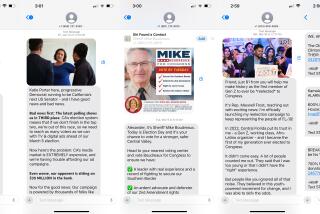High-Tech Lobbying Dials Wrong Number : Washington: Special interests can make it appear that their point of view is coming from ordinary folks.
- Share via
WASHINGTON — Steve Raby, Sen. Howell Heflin’s top aide, was surprised when a letter signed with his own name arrived in the office strongly objecting to President Clinton’s health care plan.
The letter--and a nearly identical one a week later--was generated by the Health Care Leadership Council, a business coalition that aired radio spots urging listeners to call a toll-free number to be put in touch with their members of Congress on health care.
Raby had called the number, but had not given permission for any letter to be sent to his boss, an Alabama Democrat. “I said, ‘I disagree with your message,’ ” he recalled telling the operator.
Jack Bonner, whose lobbying firm ran the campaign for the council, said such incidents are rare. “You’re going to have a few mistakes happen. It’s not intentional, and it’s against all written and oral policies,” he said.
But the episode raises questions about the dangers inherent in high-tech lobbying and its opportunities for abuse.
“It’s a way for special interests to appear to be coming from the grass-roots,” said Sen. Byron Dorgan (D-N.D.), who said his office has also received technology-generated mail misrepresenting constituents’ feelings.
The discrepancy was discovered when his office wrote back to North Dakotans acknowledging their letters. “We’ve had letters back from people unaware of the fact that something has been sent in their name, and saying, ‘In fact, I don’t feel that way,’ ” Dorgan said.
One danger, said Dorgan, is that the advertising or phone call that prompts people to contact their lawmakers may not fully disclose who is paying for the lobbying effort.
“The person probably has no idea, (for example,) that they’re calling on behalf of a pharmaceutical manufacturer,” he said. “The economic interest is not disclosed. It could be a way for a big pharmaceutical company to use a low-income senior citizen to do (its) bidding in an unwitting way.”
Bonner disagrees, saying his services only facilitate democracy.
“Democracy, lawmaking, politicking is never a clear-cut, clean, pristine process,” he said. “But it is infinitely better that any group that has a legislative interest . . . take their message outside the Beltway to the people.”
His job, Bonner said, is to make it easier for those who agree with his clients to communicate their support to Washington.
Those who answer the phones at the Capitol say many callers know little more than what they have just seen or heard in a television or radio spot, words chosen less to educate than to fan the flames of fear or anger.
“We like to flesh out some reasons so we can tell the congressman, to know what people are thinking,” said Trish Riley, an aide to Rep. Tim Holden (D-Pa.). But when asked why they hold their opinions the callers often say, ‘ “I’m not sure. I just don’t want you to vote for it,’ ” she said.
“People are real confused. They don’t want to leave their name and number. They just want to get off the phone.”
Dorgan told of one caller to his office who began the conversation, “Do you know what I’m supposed to tell you? It has something to do with voting.” The North Dakota small businessman then added, “Something to do with the health plan, I think.”
Asked if he wanted to voice an opinion on health care to Dorgan, the man replied, “Not really. I don’t know how I feel yet. I told that lady that when she called, but she said she was going to transfer me anyway.”
The practice of selectively putting through only the callers who agree with the lobbying client angered at least one lawmaker, Rep. Ike Skelton (D-Mo.).
“I want people to call and give me their honest-to-goodness thoughts,” Skelton said. “These people are blocking out some and letting others go through.”
Bonner said it would be absurd for a lobbying group to pay to deliver their opponents’ views.
“I know of no 800 line used for an advocacy purpose where people are put through on the other side” of the issue, he said.
More to Read
Sign up for Essential California
The most important California stories and recommendations in your inbox every morning.
You may occasionally receive promotional content from the Los Angeles Times.












